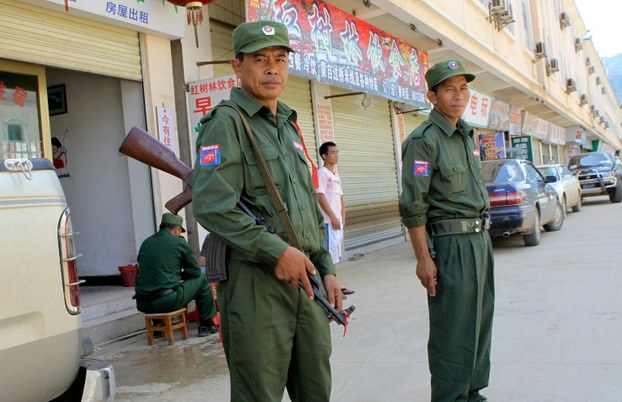Myanmar: 'This war has been disastrous for civilians'
| Publisher | Radio Free Asia |
| Publication Date | 5 March 2015 |
| Cite as | Radio Free Asia, Myanmar: 'This war has been disastrous for civilians', 5 March 2015, available at: https://www.refworld.org/docid/5507ebd015.html [accessed 26 May 2023] |
| Disclaimer | This is not a UNHCR publication. UNHCR is not responsible for, nor does it necessarily endorse, its content. Any views expressed are solely those of the author or publisher and do not necessarily reflect those of UNHCR, the United Nations or its Member States. |
2015-03-05
 Ethnic Kokang soldiers stand outside a deserted market in Shan state in a file photo. AFP
Ethnic Kokang soldiers stand outside a deserted market in Shan state in a file photo. AFP
He Shaochang is a former high-ranking Myanmar army officer and member of Myanmar's parliament from the Kokang ethnic minority region near the country's northern border with China. He told RFA's Mandarin Service on Thursday that the majority of local people don't approve of veteran commander Peng Jiasheng's bid to retake the region, prompting prolonged military clashes between government troops and Myanmar National Democratic Alliance Army (MNDAA) rebel forces since Feb. 9:
RFA: Was this war a surprise to you, did it seem to blow up suddenly?
He: Yes it was very sudden. We had heard intelligence, heard people say that they planned to return to Kokang. But at the time, we didn't believe they would really do it. We wanted to see if they would come out formally and say that they wanted to come back. But we never thought there would suddenly be fighting like this.
RFA: What has been the effect of this war on the civilian population?
He: It has been disastrous for civilians. There have been deaths, and there have been injuries. In particular, the Myanmar government forces haven't been able to distinguish between the civilian population and the rebel forces under Peng Jiasheng. They wear civilian clothes, you see. They don't wear uniform. So there have been a lot of cases in which civilians have got hurt unintentionally.
RFA: What is your opinion of the slogans that the rebel forces are using, for autonomous rule, and the like?
He: Kokang already has autonomy. They have had it since 2010. So I can't tell you why they shout these slogans. Kokang already has self-rule. The head of the Kokang autonomous government is Bai Suocheng. They have their own army and together with the border police, they number more than 600 people.
But now, the Myanmar army holds the whole of Kokang, so they won't be able to defeat them, or force them to retreat. Nobody could.
RFA: Do you think the ethnic Chinese are torn between considering themselves Chinese and considering themselves to be citizens of Myanmar?
He: You have to make a distinction between the Chinese and the ethnic Kokang. Chinese people are Chinese people, and Kokang are Kokang. They aren't the same thing at all. We Kokang are citizens of Myanmar with certain rights. That's how we can become members of parliament. If I was Chinese, I wouldn't be allowed to be in the congress.
RFA: So you feel that someone who is of Chinese origin could make their home in Myanmar?
He: I was born in Myanmar, and my ancestors were all from here. Their graves are in Myanmar. Don't talk to me about blood ties. If I went to China, the government wouldn't recognize me as a Chinese citizen. Neither would Taiwan recognize me as a Taiwanese. Wherever I go, they say I am from Myanmar.
RFA: So how can this conflict be resolved?
He: There has to be a peaceful settlement, through discussion and debate. That's the only appropriate way to do it, to sit down at the table and talk.
RFA: Does Peng Jiasheng have strong support among the Kokang?
He: No, he doesn't. He doesn't. We want a peaceful resolution. We don't want mayhem. We want to live our lives in peace. We don't like war. I am against it.
I believe that more than 40,000 people [out of Kokang's 55,000 population] don't like war. They are against war. We have decided to accept the leadership of central government, to do as they tell us. We are determined to do this.
Reported by Lee Tung for RFA's Mandarin Service. Translated by Luisetta Mudie.
Link to original story on RFA website
